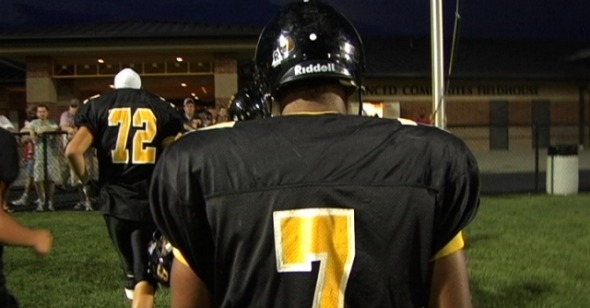Stuck in the Middle
By Benjamin Mercer
45365
Dir. Bill Ross IV and Turner Ross, U.S., Seventh Art Releasing
Occupying a strange zone between nostalgic homecoming and generalized snapshot of Middle America, Bill Ross IV and Turner Ross’s pleasantly lackadaisical documentary 45365 observes daily life in the brothers’ native Sidney, Ohio. In the significant downtime between lovely landscape shots, the Rosses check in with select residents of the Upper Miami Valley city of 20,000—the members of a high school football team, a judge running for re-election, a mother and her ne’er-do-well son, a teenage girl on the verge of breaking things off with her boyfriend, etc. There’s no particular story here, just a stretch of time passed with people whose concerns seem mostly scaled to the municipal; gradually, there emerges a portrait of self-contained small-city life in 45365’s titular ZIP code. The resulting whole is often very beautiful, if not particularly satisfying, though for those who prefer documentaries that corroborate received ideas over those that make the seemingly familiar strange, this might be just the ticket.
From the first shot of 45365—a train roaring by in a blur—it’s clear that the filmmakers are just passing through, more interested in registering a range of impressions than carefully following any narrative through lines. But the Rosses rely heavily on the local media’s packaging of micro-narratives to give some semblance of shape to the daily life observed on fairgrounds and in living rooms. There are ample front-page newspaper headlines, TV news packages, and requests taken by one DJ at “Your variety station, HITS 105.5,” whose presence here seems almost akin to that of Wolfman Jack in American Graffiti (the Rosses frequently cut from his studio to the surrounding environs, without interrupting the sound of his broadcasts, suggesting that he’s standing above the action or perhaps even orchestrating it). The codirectors keep themselves off-screen, and they eschew explanatory titles and voiceovers, but direct cinema this is not.
When they’re off the airwaves, the Rosses focus not so much on presenting folks in all their complexity as on the easygoing manner with which they go about their business. The result is a film that seems content to skim the languid surface of things. 45365 mostly takes a shine to familiar, genial types—the officer issuing a DUI to a woman he’s been cordial with for years, the kindhearted but tunnel-visioned high school football coach who is better at giving rousing locker-room speeches than exchanging basic pleasantries in a barbershop. The filmmakers seem to hold the (erroneous) belief that a few moments of backseat vérité—an unobtrusive lingering while people shoot the shit—will go a long way in giving depth to their subjects. Ironically, one of the film’s few psychologically revealing moments comes when the camera is pulled from the observational sidelines and implicated in the action: We see a mother harass her troubled son into returning a Xanax he stole from her purse; as a feeble excuse for the theft, he points to the camera and claims that he and the cameraman were going to split the pill.
45365 ends with a rather startling, and surprisingly moving, turn to the personal, which somewhat redeems the foregoing small-talk blandness by reminding that this film is on one level also a recapturing, less about specific people than ways of evoking a disappeared past—the Sidney where the Rosses grew up—through the place as it exists today. A cop’s late-film discussion of the continuity of generations—how parents tend to raise their kids to behave the same way they do, deliberately or not—suggests why the Rosses might have been attracted to certain small town America archetypes: These stock figures were familiar from their childhood.
At first, the conclusion of 45365 looks like something out of Friday Night Lights. After the football coach raises the Big Game stakes in a rousing pep talk (“Got Channel 2 news here, it’s in front of a homecoming crowd. You know, this is what high school football is about”), the players roar out of the locker room. The filmmakers follow them for a while as they jump around excitedly, but as they take the field the camera backs away, tracking along behind one end zone of the gridiron while the line of scrimmage forms at the other. Then the filmmakers suddenly cut to the desolate, depopulated field in wintertime. The shots that follow are all winter-wonderland-scapes, scored to the Flamingos’ version of “I Only Have Eyes for You.”
The very last image of 45365 is of a drive-in movie theater, the white of the towering screen set against the white of the accumulated snow. It’s not directly suggested, but the theater’s appearance intimates the filmmakers must have had some memorable viewing experiences there. In this wintertime sequence, there’s a poignant sense of time passing and time past, making more understandable the earlier favoring of quick impressions over deeper engagement. But this deliberate push toward the lightly nostalgic feels like too little, too late. The Rosses’ depiction of the Buckeye State and a swath of its inhabitants doesn’t lack for warmth, but they unfortunately never find a proper balance between objective portraiture and subjective trip down memory lane.
